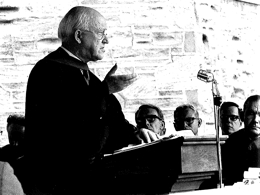Some excellent resources for the building of healthy Churches from 9Marks ministries here.
Category Archives: Evangelism
Evangelism in a Post Modern Society
Five Reasons Christians Don’t Evangelize
Virginia. In an and when they do we’re not really ready to give an answer. Evangelical churches talk a lot about evangelism, but according to popular surveys and anecdotal impressions most church members don’t share their faith very often.
WHY DON’T WE EVANGELIZE?
I’d like to suggest five reasons that churches and church members don’t share the gospel as part of their normal course of life. Other articles in this Journal suggest ways to remedy this situation, but for now let’s stick with diagnosing the problem.
1. Churches isolate Christians from unbelievers
First, churches isolate Christians from unbelievers. Simply put, a lot of Christians don’t know any unbelievers. Though our daily lives put us into regular contact with many people who don’t know Jesus, it’s easy to go through life without having close relationships with any of them.
Churches enable this isolation in a couple ways. Many churches run a host of weeknight programs and then define being a good church member in terms of attendance at those programs. As a result, the calendars of many Christians are filled up with church activities and there is little time to have neighbors and co-workers into their homes.
In addition, some congregations cultivate hostility toward the world. As our culture becomes more explicitly hostile to Christianity and biblical morality, it’s easy to allow a bunker mentality to set in. When that happens, the outside world becomes a bogeyman and the way for God’s people to be holy is to keep their distance from it. So Christians live lives on parallel tracks from the world, with their own schools and businesses and sports leagues and scouting programs, but very few chances to build relationships with unbelievers.
2. We believe that evangelism is extraordinary
A second reason Christians don’t evangelize is that we believe it’s extraordinary. We suspect that evangelism is only for those who have the gift of evangelism, or for pastors and other professional Christians. And so they simply don’t feel like they are capable of sharing the gospel. From time to time people in my congregation will bring their friends or family to me so that I can tell them about Jesus, and I have to challenge them to step up and do it themselves! After all, in Acts 8:1-4 it’s not the apostles but the “normal” Christians who take the message about Jesus out of Jerusalem and into the wider world.
3. Churches don’t talk about the cost of following Jesus
Third, our churches don’t talk about the cost of following Jesus. Yet evangelism will be costly. There’s really no way to tell people that you believe God took on human flesh by being birthed by a virgin and then, after dying on a cross, rose from the dead and soared back up to heaven without at least running the risk of losing their favor. But that’s okay. The apostle Paul says that God intentionally saves us in a way that will seem foolish to the “wise” of our world (1 Cor. 1:18-29). Our message will not be well received by those who are perishing, but will be like a stench in their nostrils (2 Cor. 2:14-16).
If I understand Paul correctly, it’s actually God’s plan for you to suffer some as you share the gospel. If you don’t agree, read through the book of Acts and just make a note of every time someone shares the gospel and something bad happens to them.
But many churches never confront their people with the reality that following Christ will cost them. We teach them that God is all about them and their sense of personal wellbeing. So when it comes time to pay the price and share the gospel, many of us simply aren’t willing to lose our reputations.
4. We look for immediate results
Fourth, we look for immediate results. Of course, it’s easy to become discouraged about our evangelism. Maybe we read a book or listened to a sermon and went out and shared our faith, only to grow discouraged when nothing visibly happened. I think many Christians have simply given up on evangelism because they made an effort and didn’t see any results.
But we simply aren’t in a position to judge what God is doing in any given situation. It may be that in God’s plan we are supposed to be the first in a long line of people who evangelize a person before they come to Christ. I can think of plenty of examples of evangelistic conversations and efforts that seemed like a waste at the time. It was not until much later that I found out that the person had come to Christ.
The gospel is the power of God for salvation (Rom. 1:16), and the word of God is alive and powerful (Heb. 4:12-13). We must cultivate confidence that the Lord who causes the growth will accomplish his redemption. He will save souls. He often does not do it according to our timetables, and he may not choose the people we would choose. But he will use us if we are faithful.
5. We aren’t clear on the message
A final reason we don’t evangelize is that we aren’t clear on the message. When someone asks to join our church, one of the things that I ask is for them to briefly summarize the gospel message (think 60 seconds). And I am consistently surprised by how many Christians find it difficult to do that. It’s not that they don’t believe the gospel—they do. It’s not that they are ignorant—many of them know their Bibles very well. And while they might be nervous or surprised by the question, it’s still a disturbing trend. There’s no way to share the gospel if you aren’t prepared to share the gospel.
It makes no sense at all, unless…
The Preacher’s Job
“I just want you to know, Mr. Washer, 22 people, I believe it was are on their way to heaven now because last night they prayed that little prayer that you are always speaking against.”
And I wrote him back and I said, “I had no idea you were that charismatic.”
And he wrote me back, “Well, I am not charismatic. Why did you say that?”
I said, “Because apart from a supernatural revelation from God, explain to me how you know they were converted.”
And he said, “Well, that is not my job.”
I said, “Then what is your job, sir? Your job is that when you have properly preached the gospel and you have called men to repentance and faith that even though you have surveyed their life for a few hours in counseling, deep counseling, you depart from them with both promises and warnings. Promises that if God truly continues this work, it is evidence that he began it; and warnings that if after this night or after a short period of seeming to walk with Christ they fall away or turn away, it is evidence that nothing happened to them that night.”
Evangelism Is Highly Theological
 “Why is it that you call people to repent? Why do you call them to believe the Gospel? You cannot deal properly with repentance without dealing with the doctrine of man, the doctrine of sin and the wrath of God against sin. Then when you call men to come to Christ and to give themselves to Him, how can you do so without knowing who He is, and on what grounds you invite them to come to Him, and so on. In other words it is all highly theological. Evangelism which is not theological is not evangelism at all in any true sense. It may be a calling for decisions, it may be a calling on people to come to religion, or to live a better life, or the offering of some psychological benefits; but it cannot by any definition be regarded as Christian evangelism, because there is no true reason for what you are doing apart from these great theological principles. I assert therefore that every type of preaching must be theological, including evangelistic preaching.”
“Why is it that you call people to repent? Why do you call them to believe the Gospel? You cannot deal properly with repentance without dealing with the doctrine of man, the doctrine of sin and the wrath of God against sin. Then when you call men to come to Christ and to give themselves to Him, how can you do so without knowing who He is, and on what grounds you invite them to come to Him, and so on. In other words it is all highly theological. Evangelism which is not theological is not evangelism at all in any true sense. It may be a calling for decisions, it may be a calling on people to come to religion, or to live a better life, or the offering of some psychological benefits; but it cannot by any definition be regarded as Christian evangelism, because there is no true reason for what you are doing apart from these great theological principles. I assert therefore that every type of preaching must be theological, including evangelistic preaching.”
– Martyn Lloyd Jones, ‘Preaching and Preachers’, pg. 65.
Biblical Conversion v. Decisional Regeneration
Keep on Sharing the Gospel
 “I think one of the main reasons we struggle to tell people about Jesus is that deep down we just don’t think it will ever work. We think we’ve already tried to share with people before and nobody was interested. We imagine sharing our faith to be nothing but muscling up our strength to go do our duty and embrace failure. We soldier on, expecting fruitlessness, ‘did it, pastor.’
“I think one of the main reasons we struggle to tell people about Jesus is that deep down we just don’t think it will ever work. We think we’ve already tried to share with people before and nobody was interested. We imagine sharing our faith to be nothing but muscling up our strength to go do our duty and embrace failure. We soldier on, expecting fruitlessness, ‘did it, pastor.’
Most of us lack faith that God actually has people prepared for us who will listen. This is where the doctrine of predestination is the best news in the world. We have not yet exhausted the number of God’s elect. God has more people to be saved, so keep on sharing.
When Spurgeon was asked why he kept preaching the gospel when he believed in election, he replied, “Because the elect don’t have yellow stripes down their back.” In other words, he could not see who was elect and who was not, so he had to keep sharing, believing that God had more people who would listen.
The sovereignty of God is the greatest motivation for mission. God still has people, preordained from the beginning of time to be responsive to the gospel message. You may think that you have already shared with everyone who would possibly be interested in the gospel, but it is not so. Remember: that the Spirit of God goes before you. As the it says in Zachariah 4:6, ‘Not by might, nor by power, but by my Spirit, says the Lord of hosts.’
God is more interested in saving people than we are in telling people how to be saved. So as we keep sharing, he will keep providing some to be saved.”
– Kevin DeYoung
God Ordains Both the Ends and the Means
 Dan Phillips, at the Pyromaniacs blog site wrote a short article entitled, “A stick, salt water, salvation — and us.”
Dan Phillips, at the Pyromaniacs blog site wrote a short article entitled, “A stick, salt water, salvation — and us.”
“God works through means,” we say.
And it’s true. In fact, He usually works through means. That is to say, God uses some portion of His creation to affect some other portion of His creation.
This is maybe better understood if we think of the one occasion in which God used no means: the creation of the universe. Unless you wish to press the thought that God used His word (Ps. 33:6), God did not create the universe by means of anything in the universe. One timeless moment; the triune God alone; the next (first!) moment, a word, and bam! — the universe.
Otherwise, He uses means. Adam must feed himself, must build a shelter. Eve must make clothes. Noah has to cut down a lot of trees. And so on.
Now, sometimes the means are plain and proportionate. Right now, I’m tapping keys, and letters are appearing on the screen. No letter appears without a tap; a tap produces a letter. Or a space. Means, simple and straightforward.
And then there’s this scene:
The Lord said to Moses, “Why do you cry to me? Tell the people of Israel to go forward. 16 Lift up your staff, and stretch out your hand over the sea and divide it, that the people of Israel may go through the sea on dry ground. 17 And I will harden the hearts of the Egyptians so that they shall go in after them, and I will get glory over Pharaoh and all his host, his chariots, and his horsemen. 18 And the Egyptians shall know that I am the Lord, when I have gotten glory over Pharaoh, his chariots, and his horsemen.”
19 Then the angel of God who was going before the host of Israel moved and went behind them, and the pillar of cloud moved from before them and stood behind them, 20 coming between the host of Egypt and the host of Israel. And there was the cloud and the darkness. And it lit up the night without one coming near the other all night.
21 Then Moses stretched out his hand over the sea, and the Lord drove the sea back by a strong east wind all night and made the sea dry land, and the waters were divided. 22 And the people of Israel went into the midst of the sea on dry ground, the waters being a wall to them on their right hand and on their left. (Exodus 14:15–22)What obvious causal relationship was there between Moses lifting his staff, and that great body of water cleaving in two? None. Zero. If he’d poked it in the sea, he’d have displaced a bit of water. But holding it out? No relationship whatever. After all, this is a walking stick. It isn’t some wand from Hogwarts.
Yet, would the waters have parted, had Moses not stretched out the staff? No.
So though there was no direct causal relationship between Action A and Action B, the former was necessary for the latter. Why? Because God ordained it to be so. Because God ordained to use the means of Moses raising his staff. When Moses did what God told him to do, God accomplished what Moses was unable to effect.
Now to the abrupt payoff.
Tell me how this relates to Romans 10:8-17, and what effect this truth should have on you and me.
Don’t let me down.
Tom Chantry commented…
The only thing that made holding out a rod over the sea effective was the fact that God had ordained it, and the only reason Moses could have thought to do it was that God told him to.
Similarly, the only reason preaching is ever effective to the saving of souls is that God ordained it to be so, and the only reason it occurs to us to preach is that God told us so.
Having little time to unpack all the implications, I’ll stick to two that jump to mind.
1. As a preacher, I should feel about as much pride of accomplishment when someone is saved as Moses should have felt when the sea parted. I had about as much to do with it as he did.
2. For a preacher / church to decide that preaching isn’t likely to work and we ought to try something else is roughly equivalent to Moses deciding to chuck rocks into the sea instead of holding out his staff.
Lots to ponder here… Selah.
London Olympics – Two Short Stories
Two short stories from the Olympics you should know – from my friend Justin, who flew from the USA to London to share the gospel.
